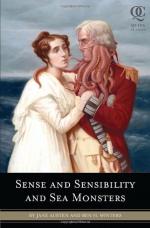|
This section contains 790 words (approx. 3 pages at 300 words per page) |

|
Irony Used to Expose Human Folly in "Sense and Sensibility"
Summary: Three passenges of Jane Austen's "Sense and Sensibility" are cited to show the author's use of human and honor to skewer human folly. This is especially used to mock chracters who based their opinions about others on trivial, artifical qualities.
Each of the three passages illustrates Jane Austen's irony and humour. The target of her irony is human folly - in particular, the folly of allowing one's behaviour and judgment to be dictated by an excess of sensibility.
In the first passage Marianne's judgments are made instantly. She "had seen less of his person than the rest (..) But she had seen enough of him to join in the admiration of the others..." Austen's third person narration clearly shows us the superficial basis upon which Marianne's judgments are so hastily made - "his manly beauty and more than common gracefulness", "his exterior attractions." Austen shows us how love at first sight, which is what Marianne feels for Willoughby, is a product of an over active imagination, over stimulated perhaps by the reading of too many romantic novels. "His person and air were equal to what her fancy had ever...
|
This section contains 790 words (approx. 3 pages at 300 words per page) |

|


